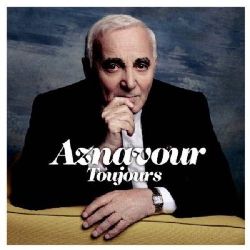Charles Aznavour – Toujours (2011)
Charles Aznavour – Toujours (2011)

01. Va 02. Viens m'emporter 03. Tu ne n'aimes Plus 04. J'ai connu 05. Ce Printemps Là 06. Elle (En duo Avec Thomas Dutronc) 07. Flamenca Flamenco play 08. Les Jours 09. Que J'aime J'aime ça 10. Des Coups de Poing 11. La Vie est faite de Hasard 12. L'instinct du Chasseur play Art Direction – Lévon Sayan Organ – Eric Wilms Piano – Jacky Terrasson Piano, Electric Piano – Eumir Deodato Realization, Arranged By – Erwin Autrique, Eumir Deodato, Yvan Cassar Vocals – Charles Aznavour
Charles Aznavour's new studio album, titled Aznavour Toujours, is released digitally by Capitol/EMI. Aznavour forever. Rather than an album title, a self-portrait. He's somewhat prodigious, given both the dizzying heights he reaches and his unswerving loyalty to his fans and his art. Aznavour has been part of our lives forever, for most of those of us who listen to his songs. Forever the Aznavour of sweet nothings and noble sentiments, humble people and great melodies. Forever the Aznavour of great classics and songs we've never heard and which suddenly hit us in the pit of our stomach or yank our heartstrings. Because Charles Aznavour doesn't like to stand still. He's never been one to take a distance, settle down to retirement or dream of going home. No, he's never let up, never stopped writing. So yet again, he has penned a dozen songs, twelve pure Aznavour songs. There's the full breadth and power of the legend, who dares to mix our most intimate secrets with the tidal wave movements of humankind, the most volatile sensuality with looming existential questions. He sets a love story against the backdrop of the May 68 students' revolution in Paris in Ce printemps-la, lingers between the sheets with Que j'aime j'aime ca and untangles the frippery weave of our existence in Les Jours…
In this intermingling of registers, the singer-songwriter fascinates and dazzles, in J'ai connu, a sprightly song that Yvan Cassar dressed up with light-hearted rustling and tiny sparks, while the lyrics take on board humankind's horrors, the genocides of the last century and the lowest of mass injustices– "Ce que l'homme fait a l'homme/L'animal ne le fait pas" (What man does unto man, no animal stoops to). Aznavour is on full throttle, never losing sight of the vast machinery of history even as he sings of two lovers hand in hand, and always distinguishing, behind the fracas of the world, the poor shattered world of anonymous man. Because as ever and forever, he is obsessed with justice, with hitting the nail on the head. Which is why musicians rarely resist the honor of playing for Charles Aznavour. So this album features a slew of big names, whether session musicians or stars of the French scene: pianist Jacky Terrasson on five tracks, bass guitarists Laurent Vernerey and Jean-Claude Ghrenassia, drummer Loic Ponthieux, accordionist Lionel Suarez and guitarist Pedro Xavier Gonzales to name but a few. And Thomas Dutronc, on vocals and guitar for Elle, a vibrant, radiant duo.
For the arrangements, Aznavour called on Eumir Deodato (500 albums for Frank Sinatra, Aretha Franklin, Astrud Gilberto, Bjork and Christophe to name but a few) and Yvan Cassar (Mylene Farmer, Johnny Hallyday, Claude Nougaro and Nusrat Fateh Ali Khan) and the album travels to Brazil and Paris, with an occasional little trip to Broadway and even Spain for Flamenca, flamenco, in which he sings of an "Enfant type d'Andalousie/Mele d'Islam et de Chrétien/Entre priere et poesie/Dont les accents tissent les liens" (Olive-skin kid in Andalusia/mixing Islam and Christendom/between prayer and poetry/in accents that forge ties"). Aznavour Toujours travels because Aznavour has always travelled, – in space and through memories and sensitive, surging spirits. He knows all the weakness and faults of humankind, yet he is forever celebrating hope, love, pleasure and sharing. He sees life as a combat, in Des coups de poing, a superb reverie on life in which he has the courage and class, when evoking injuries sustained, to admit to blows dealt. But he also sees life as "le tresor dont le destin/Nous fait l'offrande" (a treasure that destiny/offers up to us) in La vie est faite de hasards (Life is a series of accidents). They're songs, of course. But they're much more. Lessons in life, for example, like Va (Go), the elegance of which any woman would appreciate with the fading of passion. And heart-stopping celebrations of the happiness people can give one another, like Viens m'emporter… We soon realise why Karl Lagerfeld so enjoyed taking his album cover photograph: he met an artist, but also a myth. One of the last myths left, a myth that helped forge and free us, helped us grow. Aznavour, forever. --- article.wn.com
Płyta zabiera słuchacza w podróż po Brazylii i Paryżu, na małą wycieczkę na Broadway, a nawet na wakacje do Hiszpanii w utworze "Flamenca, flamenco", gdzie artysta śpiewa o "Enfant typé d’Andalousie/Melé d’Islam et de Chrétien/Entre priere et poésie/Dont les accents tissent les liens" (Andaluzyjskim chłopcu o oliwkowej skórze/ który łączy islam i chrześcijaństwo/ pomiędzy modlitwą a poezją/mówiąc z akcentem, który tworzy więzi).
Muzyk zdaje się doskonale znać słabości i przewinienia ludzkości, jednocześnie zaś nieustannie celebruje nadzieję, miłość, przyjemność i wspólnotę. Aznavour postrzega życie jako ciągłą walkę – tak, jak w utworze "Des coups de poing", w którym artysta prowadzi rozważania nad swoim życiem przyznając, że było ono pełne ciosów zarówno odebranych, jak i zadanych. --- onet.pl
download (mp3 @320 kbs):
yandex mega mediafire cloudmailru ulozto
Zmieniony (Wtorek, 02 Październik 2018 07:58)








